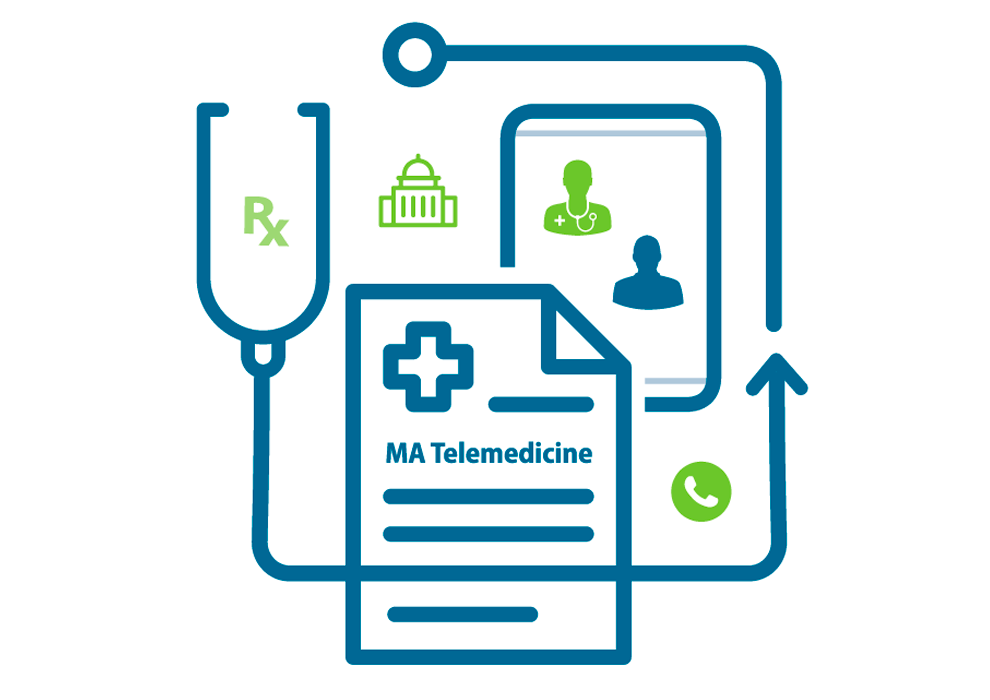BY LEDA ANDERSON, LEGISLATIVE COUNSEL, ADVOCACY AND GOVERNMENT RELATIONS

Illustration by Chris Twichell
In a unique interactive and ongoing conversation, with high stakes for codifying telehealth policy in Massachusetts, stakeholders gathered on a series of video calls this spring to provide perspectives on how to safeguard quality and equity in health care through telehealth technologies.
Speaking in a unified voice, physicians representing the Massachusetts Medical Society, alongside other physician leaders, participated in a five-part listening session facilitated by the Division of Insurance (DOI) and MassHealth. Together, the physicians made the argument for physician autonomy, payment parity, and patient access, with the physician voice playing a prominent role in shaping how the state will ultimately implement the recently enacted telehealth law.
“One of the only good things to come out of COVID was the realization that much of medical care can be effectively delivered via virtual means, and our patients have been the big beneficiaries of the systemwide embrace of this new technology,” says Lee Schwamm, MD, director of Massachusetts General Hospital’s Center for Telehealth and a frequent call participant. “We must fight for their continued access to services delivered by providers in a simple, private, and standardized manner, free of unnecessary administrative burden or barriers. Ensuring the safe, effective, and patient-centered implementation by the DOI of the new virtual care legislation in Massachusetts is incredibly important, and it was a pleasure to work hand in hand with representatives of the MMS to make certain those voices were heard.”
The listening sessions came in response to a large state health care bill, Chapter 260 of the Acts of 2020 (c.260), signed by Governor Charlie Baker in early January 2021. The sweeping policies encompassed in c.260 have the potential to codify many of the interim telehealth gains created under the public health emergency.
Among other provisions, the bill set general policies for telehealth. However, it is the oft-overlooked regulatory rule-making process — in this case, how the DOI chooses to interpret and implement the law — that will substantially shape the role of telehealth in our care delivery system, which will be of one of the most significant legacies of the pandemic.
Physicians Provide a Unified Voice, but Questions Remain
As the state grapples with how to implement telehealth provisions from c.260, the physician community has provided a unified, leading voice with a clear foundational message: telehealth is an evolving modality for care delivery that should be treated and compensated on par with in-person services.
The DOI and MassHealth are to be commended for enabling a conversational, informative process that engaged all stakeholders — insurers, physicians, patient advocacy groups, and others. Advocacy that typically takes place behind closed doors was brought to the fore. The result was an interactive, collegial process and dialogue that helped crystallize implications of the law and its potential impact on patients, physicians, and health care in general.
Despite the collegiality, these listening sessions highlighted stark contrasts in how stakeholders are urging the DOI and MassHealth to interpret certain provisions from c.260, which will ultimately impact the ability of physicians to offer telehealth services and for patients to access care via telehealth. Most notably, c.260 contains high-level definitions of behavioral health, chronic disease management, and primary care services with corresponding requirements for parity in reimbursement: behavioral health services — delivered via interactive audio/visual technology or audio-only technology — are to be compensated on par with in-person services in perpetuity; chronic disease management and primary care services are to be reimbursed at parity until January 2023.

Dr. Barbara S. Spivak
But many questions remain. For example, is parity for the provision of behavioral health services limited to certain licensed mental health professionals, or will it include primary care and other physicians who provide critical access to mental health services? Insurance carriers have pushed for a more limiting definition, which belies the critical role primary care and other physicians play in delivering behavioral health care. “For too long, the health care system has carved out mental and behavioral health care,” says MMS Vice President Barbara S. Spivak, MD. “With telehealth, we have a tremendous opportunity to strive toward a more integrated system of mental health care delivery. Increasing the availability of behavioral health clinicians through the collaborative care model, improving reimbursement rates, and continuing to cover various modalities of care like telemedicine will have a positive impact on our patients’ ability to receive the mental health care they deserve.”
A Quest for Equity, in Both Payment and Patient Access
The pandemic has shown what physicians already knew: telehealth has the power to improve the quality of and access to health care by removing traditional barriers for patients. But telehealth’s potential to be a great equalizer will be met only if equity is built into our policies. On the recent calls with the DOI, physicians advocated fiercely for equal coverage and reimbursement of services delivered through audio-only technology, beyond solely behavioral health services, cautioning that failure to do so could systematize discriminatory policies that will disproportionately impact historically marginalized patient populations, including patients of color and those with low incomes, as well as the elderly and others without access to broadband internet or digital devices.
The state doesn’t need to reinvent the wheel when it comes to regulating telehealth. In conformity with policy adopted in summer 2020 by the Board of Registration in Medicine, physicians are bound by the same medical standards of care whether that care is delivered in-person or via telemedicine.
“We may have sounded like a broken record at times — asking [the DOI and MassHealth] to recognize that telehealth encounters provide the same quality of care and adhere to the same, well-established standards as in-office encounters but via a different modality,” says Christopher Garofalo, MD, FAAFP, a family medicine physician who represented the Medical Society in several listening sessions. “But it is critical for the DOI to understand what care delivered through telehealth looks like in practice and to understand the impact the DOI’s guidance will have on our ability to provide high-quality, accessible care to our patients.”
The telehealth law also allows insurers to apply utilization review, including preauthorization, to determine the appropriateness of telehealth. During the listening sessions, the physician voice was invaluable, impressing upon the DOI that the decision of whether care can be appropriately delivered via telehealth is a clinical one that should be made by the physician in accordance with the standard of care.
“The physician community is unified in urging the DOI to implement strong safeguards preventing unnecessary barriers to telehealth care, such as burdensome utilization review and prior authorization, that would impede access to timely care for the breadth of populations we serve,” notes Alexa Kimball, MD, MPH, president of the Harvard Medical Faculty Physicians at Beth Israel Deaconess Medical Center. The Medical Society called attention to parallel concerns about overuse of prior authorizations for in-person care, which may create insurmountable barriers to care and unnecessary administrative burden.
The MMS was proud to advocate on behalf of all physicians and their patients, alongside partners from the statewide tMED Coalition, spearheaded by the Massachusetts Health & Hospital Association. While it is unclear when or whether the DOI will issue specific regulations or informal guidance in coming months, the MMS is continuing to submit written comments. We look forward to continued collaboration with the state toward our goal to of improved access and high-quality care for our patients in the Commonwealth.
